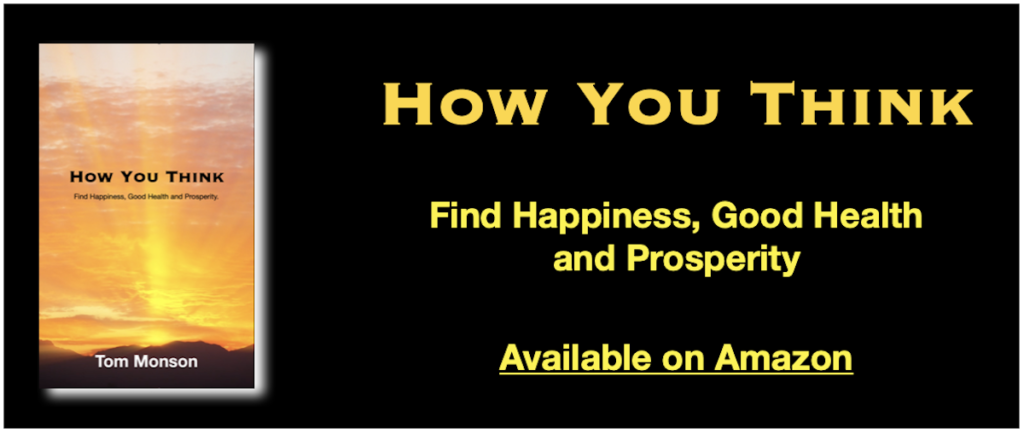How Your Thoughts Create Your Character and Everything in Our Lives
This is the second post in a multiple-part series based on the book As A Man Thinketh, by James Allen.
James Allen told us that our character is determined by how we think. This means that our thoughts and our character are the same. Our environment and circumstance will shape our character.
“The outer conditions of our lives will always match our thoughts and feelings. This doesn’t mean that our situation, at any given time, is an indication of our entire character but those circumstances are so intimately connected with some important part of our thinking that, for the time being, it is an important part of our development.” James Allen.
We are where we are because our thoughts created our character and brought us to where we are. It wasn’t chance or a mistake that brought you there, it is an irrefutable law. This is true for those who are happy with their circumstances as well as those who are not.
Here is a very important point: As developing beings, we are where we are so that we may learn and grow. And when one situation presents a lesson and we learn what it has to offer, it ends. Soon thereafter, we find ourselves in a new situation in which we also can learn a new lesson.
Another important point: As long as we believe things happen to us, we will be controlled by those things. But when we realize we have the power of thought and knowledge, we can take control of our lives, and even if we can’t change what has happened, we have the ability to change what will happen. That’s when you know your character is improving.
When you have worked on yourself to learn self-control and make yourself better you will understand that your circumstances will have a direct relationship with your altered mental condition. It is well known that when you try hard and apply yourself to repair the problems with your character, you will quickly make a measurable improvement. During this process, you will find yourself moving to a better place of certainty and peace.
The essence of a person can be called their soul, subconscious, identity, spirit, conscience, small voice within, super-ego, inner power, super-consciousness, unconscious, or the subconscious.
Allen called it the soul and told us that our souls attract what we really believe and our ingrained ideas, what we love, and what we fear will be drawn to us and move to create the circumstance in which we live. Through our circumstances, our souls receive our most cherished desires and our unhealthy desires.
Every thought we allow to enter our mind can take root, expand, eventually be acted upon, and change our life. This goes for both good and bad thoughts. Good thoughts bring good things. Bad thoughts bring bad things.
If our lives are pleasant or unpleasant, it will be for our ultimate good. We learn that our actions have consequences and either way, through pain or joy, we will learn.
The thoughts that dominate us, our unattainable desires, unhealthy thoughts, or our worthwhile and high principled values, will become who we are in both inner and outer circumstances. There are many universal laws that state this as the truth.
It doesn’t just happen for someone to end up homeless, living on welfare, or in jail — it is the result of negative or impure thoughts. Nor does a pure-minded person fall into crime by stress or other external forces — the criminal thought had long been secretly fostered in their heart and the opportunity for the crime revealed the true nature of the person’s character. “Circumstances do not make the man; it reveals him to himself.”
It is not possible to live how you live or how you want to live without a continual effort to achieve your goals and desires. You have the power to make the change. You, like every other human being, have your own soul which came to be with your birth and it will attract a combination of conditions, healthy, unhealthy, strengths, and weaknesses. It is your right and ability to choose your path.
We do not attract what we want — we attract what we are. Our whims, desires, and our ambitions are defeated at every step by our innermost thoughts and desires — whether they are good or bad. Our thoughts create us.
We imprison ourselves through our actions which are the product of our thoughts or we set ourselves free to live a noble life of freedom and a good choice by having thoughts that elevate us.
We don’t get what we wish or pray for, we get what we earn. Our wishes and prayers are only answered when they are aligned with our thoughts and actions.
And when you consider this statement as fact, which it is, then what is the point of fighting against your circumstances? You are fighting against the very thing that you are feeding and caring for — whether you believe it or not. (These beliefs may be consciously or unconsciously held.) When you realize that the thoughts and beliefs, followed by your actions are the cause of your present circumstances, you will be ready to find a solution. Whether you do or not is up to you.
We are stressed about improving our lives, but we are not willing to make ourselves better. We are therefore bound to continue the same life and condition that we worry about escaping. We will continue this cycle until we are ready to do what is necessary to make the changes we desire. Unless we are prepared to make the sacrifices required to gain wealth or find the lifestyle we want, we will not change the lives we live.
Allen gives us an example of a man who is very poor and stressed by the condition in which he lives. This man wants to improve his life and yet he tries to evade the work he does. He feels it is OK to lie to his employer because he does not feel he earns enough. This man does not understand the principles of success and will not rise from his misery because his attitude is actually attracting these horrible conditions. His lazy, lying, and weak thinking makes his life worse.
Allen also gives us an example of a wealthy man, who has a painful and chronic disease that is caused by his poor eating habits. He pays tremendous amounts of money to get well, but he will not eat the right foods in the proper portions required for good health. He wants to eat huge amounts of the food he craves and also wants to keep his health. Such a man is unfit to have good health because he does not follow the principles of healthy eating.
Finally, Allen gives us the example of a business owner who practices unscrupulous methods to avoid paying fair wages. His aim is to increase profits by lowering the wages of his workers. This man is not entitled to be successful and when he finds his reputation destroyed and he is forced into bankruptcy, he can’t understand that he caused the problem. Allen said, “he is the sole author of his condition.”
Allen introduced these cases to illustrate the fact that our conscious or unconscious thoughts are almost always the cause of our circumstances. Even though we are working toward our personal goals, we block ours success with thoughts and desires that are not consistent with what we really think and how we really see ourselves. The number of these cases are almost endless. But it doesn’t have to be this way! If you desire a different outcome, examine how the “laws of thought” can affect your life. You have the power to can change your life and all things therein.
The following paragraph in Allen’s book tells us that the circumstances of people’s lives are so complicated because they have deeply rooted thoughts and beliefs. The condition of their souls or subconscious minds cannot be judged by anyone from an external perspective. People may be honest in some ways and still have aspects of their lives that others may find offensive, or someone may be dishonest in some ways and still enjoy financial rewards. People generally believe that cheaters prosper and honest people do not. But the reality is that we cannot judge someone else in a superficial way.
“Circumstances, however, are so complicated, thought is so deeply rooted, and the conditions of happiness vary so vastly with individuals, that a man’s entire soul-condition (although it may be known to himself) cannot be judged by another from the external aspect of his life alone. A man may be honest in certain directions, yet suffer privations (lack of what is needed for existence); a man may be dishonest in certain directions, yet acquire wealth, but the conclusion usually formed that the one man fails because of his particular honesty and that the other prospers because of his particular dishonesty, is the result of a superficial judgment, which assumes that the dishonest man is almost totally corrupt, and the honest man almost entirely virtuous. In the light of a deeper knowledge and wider experience, such judgment is found to be erroneous (containing errors). The dishonest man may have some admirable virtues, which the other does not possess; and the honest man obnoxious vices which are absent in the other. The honest man reaps the good results of his honest thoughts and acts; he also brings upon himself the sufferings, which his vices produce. The dishonest man likewise garners his own suffering and happiness.”
Allen tells us that for some reason we find it pleasing to believe that someone suffers because of their virtue, but when we have cleared every disgusting and unhealthy thought from our mind, and come to peace with every negative thing that we have done in our life, will we be in a position to judge someone else. In other words, until we are in that wonderful place, we cannot judge someone else’s circumstances or actions. He goes on to say that when we gain this understanding, we will know that we were looking through our own lack of understanding, that life is, and always has been, us evolving through all our experiences and thoughts, both good and bad.
(To Be Continued next week)
Sign up to receive the rest of this series. Published each Tuesday until it is done.
Be sure to try MemNivia for sharper thinking. This sponsor’s product is amazing. Check it out!



